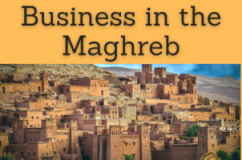Business in Morocco, Rabat, Casablanca
Foreign Trade of Morocco, Logistics. African Frontier Market, Tangier. Moroccan Businesspeople
The Kingdom of Morocco: an African Frontier Market. The Emergence of the Moroccan Businessman in Africa.
Morocco is a frontier market
The economic development of the Kingdom of Morocco (30 million people) in the last years, allowed to set up basic infrastructures and improve socio-educational needs of the Moroccan population
Moroccan strategic sectors: aeronautics, off-shoring, agribusiness, textiles, electronics, and cars

- Introduction to the Kingdom of Morocco (Maghreb)
- Moroccan Economy
- Key Sectors of the Moroccan Economy:
- Industry
- Energy
- Agriculture and Fisheries
- Transport and Logistics
- Mines
- Domestic trade
- Moroccan International Trade
- Tangier Free Zone
- Business Opportunities in:
- Industry
- Solar and wind energy
- Tourism
- Moroccan Agriculture and Fishing
- Logistics
- Retail
- Information and communications technology (ICT)
- Real Estate
- Invest in Morocco
- Moroccan Investment and Development Agency (MIDA)
- Case Study:
- Business Opportunities in Casablanca
- Business Opportunities in Rabat
- Access to the Moroccan Market
- Business Plan for Morocco
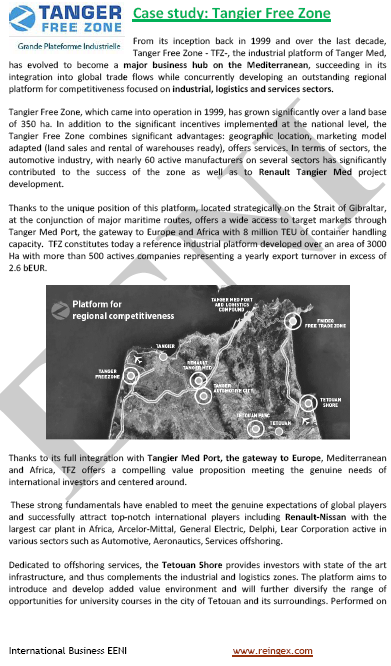
Moroccan Businesspeople
- Othman Benjelloun (the richest men in Morocco)
- Aziz Akhannouch
- Anas Sefrioui
- Miloud Chaabi
- Mohamed Hassan Bensalah

The educational aims of the Subject “Foreign Trade, Logistics and Business in the Kingdom of Morocco” are:
- To analyze the Moroccan Economy, Logistics and Global Trade
- To conduct research on business opportunities in the Kingdom of Morocco
- To explore the Moroccan trade relations with the student's country
- To learn about Moroccan Trade Agreements
- To examine the profile of the Moroccan Businesspeople
- To develop a business plan for the Moroccan Market

The Subject “Foreign Trade, Logistics and Business in Morocco” is included within the curriculum of the following academic programs at EENI Global Business School:
Doctorate: African Business, World Trade.

Master: International Business.

Languages:  or
or  Maroc
Maroc  Morrocos
Morrocos  Marruecos.
Marruecos.
- Subject Credits “Doing Business in Morocco”: 2

International Trade, Logistics and Business in Morocco.

- Port of Casablanca
- Cairo-Dakar Logistics Corridor
- Access to the Atlantic Transport Corridor (Portugal-Germany)
Sample: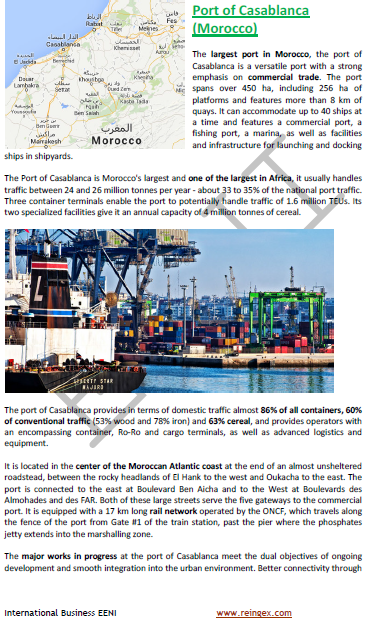


Moroccan Preferential Access and Trade Agreements:
- Morocco and the Maghrebian Economic Area
- Arab Maghreb Union
- Community of Sahel-Saharan States (CEN-SAD)
- Greater Arab Free Trade Area (GAFTA)
- Arab Mediterranean Agreement (Agadir)
- Trade Preferential System (TPS-OIC)
- EFTA-Morocco Agreement
- US-Morocco Free Agreement
- Turkey-Morocco Agreement
- Morocco-United Arab Emirates Agreement
- European Union-Morocco:
- European Union-Morocco Agreement
- European Neighborhood Policy
- Euro-Mediterranean Partnership
- UK-Morocco Agreement
- In 2017, Morocco applied to the Economic Community of West African States (ECOWAS)
- Global System of Trade Preferences
- Association of Caribbean States (Observer)
- Andean Community (Observer)
- SICA (observer)

- World Trade Organization (WTO)
- Agreement on Trade in Services (GATS)
- Agreement on the Application of Sanitary Measures
- Agreement on Technical Barriers to Trade
- Agreement on Preshipment Inspection
- Agreement on Safeguards
- Trade Facilitation Agreement
- World Customs Organization (WCO)
- Kyoto Convention
- Convention Harmonization of Frontier Controls of Goods
- Hamburg Rules (Maritime Transport)
- COTIF Convention (Rail)
- BIC
- Chicago Convention (ICAO)
- International Maritime Organization (IMO)
- Customs Convention on Containers
- CIM & CIT Rules (Rail Transport)
- International Road Transport Union (IRU)
- TIR Convention
- Guidelines on Safe Load Securing for Road Transport
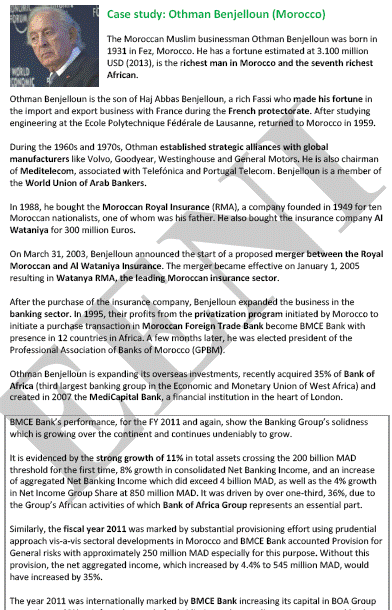

Islamic Organizations:
- Arab League
- Arab Development Funds in Africa
- Organization of Islamic Cooperation (OIC)
- Islamic Development Bank
- Economic Commission for Western Asia (ESCWA)
- Asia-Middle East (Morocco) Dialogue
- Summit of South American-Arab Countries
- Afro-Arab Cooperation
- Arab Bank for Africa (BADEA)
African Organizations:
- Economic Commission for Africa
- African Union
- AUDA-NEPAD
- African Development Bank
- Africa-Asia Partnership
- Africa-Korea Partnership
- Africa-BRICS
- Africa-Turkey Partnership

- United Nations
- World Bank
- World Trade Organization (WTO)
- International Monetary Fund
Kingdom of Morocco
- Moroccan Capital: Rabat
- Economic Capital: Casablanca
- The largest cities in Morocco:
- Official languages in Morocco: Arabic and Amazighe
- French is widely used, and Spanish in the North of Morocco
- Moroccan Government: Unitary Parliamentary Constitutional Monarchy. His Majesty the King: King Mohammed VI
- Area of Morocco: 446,550 km²
- Moroccan Population: 33 million people
- Morocco share frontiers with Algeria, Western Sahara (Mauritania), and Spain
- Abolition of Slavery in Morocco: 1922
- Independence of Morocco from France: 1956
More information about Morocco (EENI African Business Portal).
Religion in Morocco:
- 99% of the Moroccan population is Muslim Sunni (Islam)
- Fiqh (Islamic Jurisprudence): Maliki school
- The King of Morocco is considered as a direct descendant of the Prophet Mohammed

Morocco belongs to the Maghrebian Economic Area (Islamic Civilization / African Civilization).
Moroccan Economy
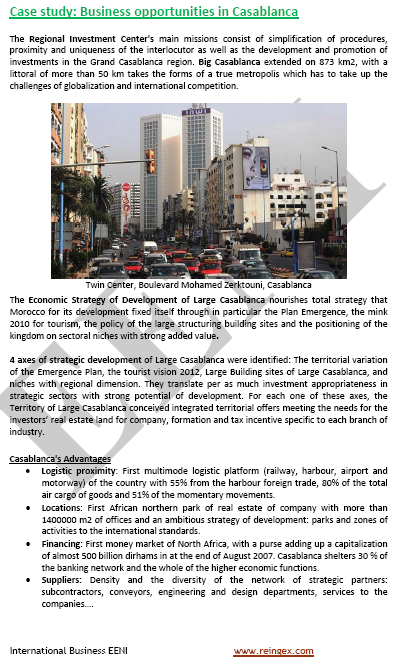
- Moroccan Aeronautical industry: 100 companies
- Top Moroccan economic sectors: tourism, industry, fishing, water, housing, and International Trade
- Excellent political stability
- Stable banking sector
- Weakness of Morocco: environmental fragility.
- The Green Plan of Morocco
- Moroccan Currency: Dirham
- Top Moroccan trade partners are France, Spain, India, Brazil, China, the United States, and Saudi Arabia
- Existence of investment, industrial zones and free zones (Tangier, Dakhla, Nador, Kenitra, Kebdan, and Laayoune)
- The headquarters of the Islamic Centre for Development of Trade are in Morocco
- The Arab Monetary Fund was founded in 139 6A.H. In Morocco
- The Businessman Sefrioui Anas (1957) is the third-richest person in Morocco. He is the owner (62%) of the Addoha Group
- The Moroccan Businessman and politician, Miloud Chaabi (1930) is the founder of the Ynna Holding and owner of the chain of hotels “Riad Mogador” and supermarket group “Aswak Assalam” in Morocco
- The largest port of Morocco: Port of Casablanca
Sample: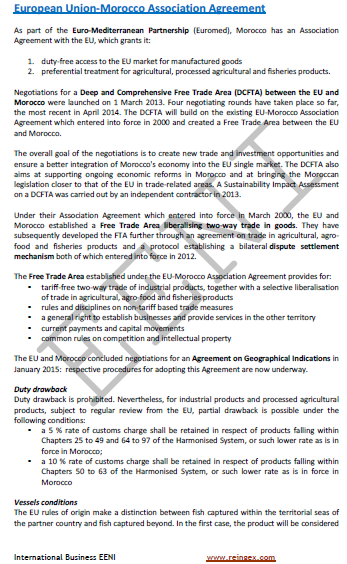
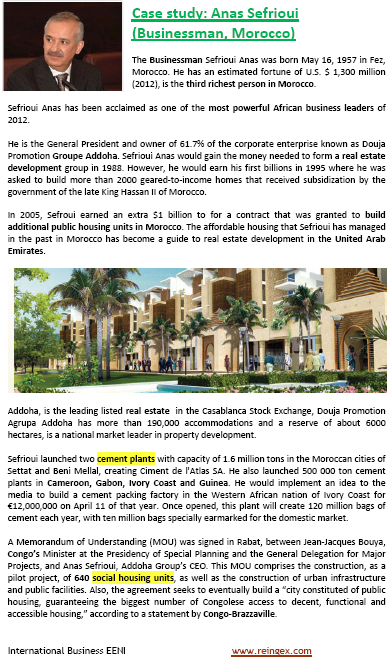
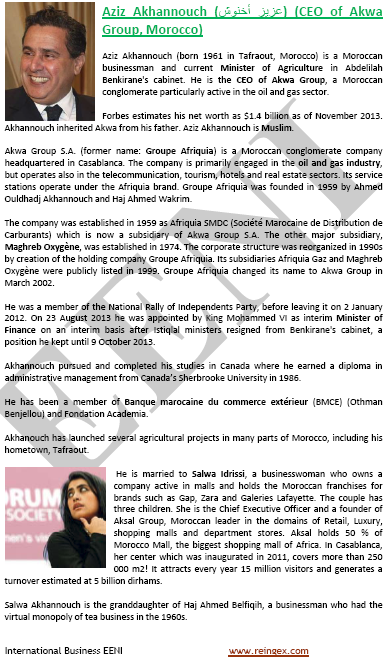
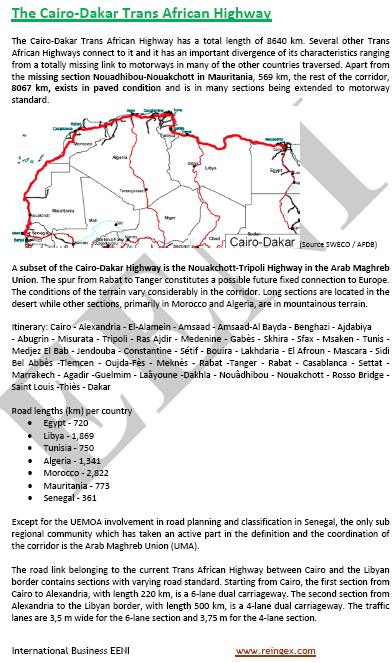
(c) EENI Global Business School (1995-2025)
Top of this page








 WhatsApp
WhatsApp